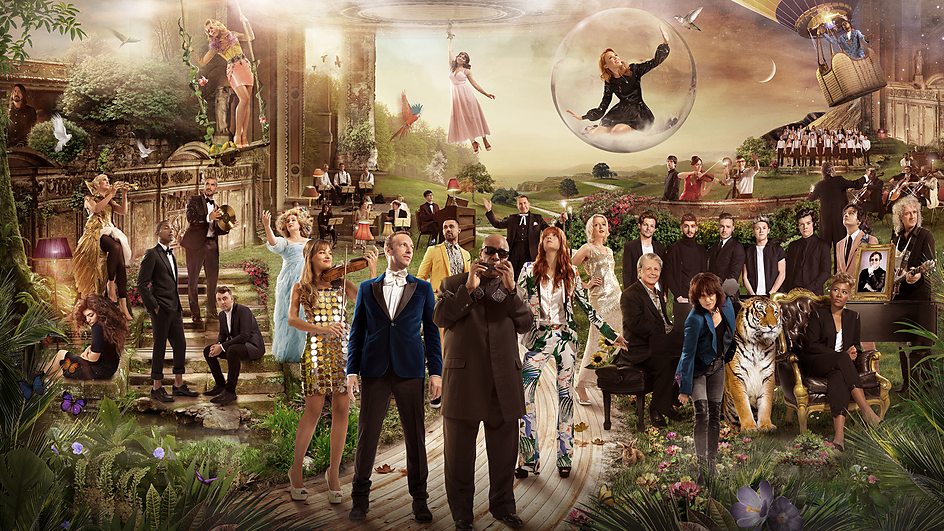Anybody with the faintest grasp of popular culture or use of social media will likely know by now that last Tuesday the BBC interrupted the regular programming of almost their entire network to air a ‘star-studded’ cover of the Beach Boys’ 1969 hit ‘God Only Knows’ – think John Lewis Christmas advert soundtrack if voiced by a cast of recognisable, inoffensive famous faces rather than ‘nondescript, faux-kooky indie girl’. Pharrell, falling ever further into his post-2013 slump, is of course present (now as the inoffensive face of hits such as ‘Happy’ and ‘Get Lucky’ – but just don’t mention his involvement in ‘Blurred Lines’ whatever you do), while Emeli Sandé, never one to turn down a major TV appearance, returns after an unusually quiet few months. Meanwhile, those trusty old cornerstones of the older generation are on hand too with cameos from Elton John, appearing so interested he scarcely bothers to even make eye contact with the camera, and Brian Wilson, with his haunting, LSD-addled stare, there, as an original member of the Beach Boys, probably to lend the whole affair a touch of ‘credibility’.
On a serious note, its part-intention to raise money as a charity single for Children In Need is of course a cause that nobody can object to – well, unless you are completely devoid of any human emotion. However, it is the ‘FOR THE LOVE OF MUSIC’ banner and the clip’s promotion of the BBC’s recently-launched BBC Music initiative, billed as “the biggest commitment from the BBC to music in 30 years”, that truly rankles. Primarily, what does it all even mean? At a time when the BBC’s most progressive music programming on television is Later…With Jools Holland, the network’s throwaway, non-specific use of ‘Music’ as a catch-all term attempts to mean everything to everyone, but ultimately comes out meaning nothing to anyone – just a safe word to wrap up its increasingly less experimental music-based programming, both on radio and TV.
As somebody that largely grew up in the digital age, perhaps shutting off that need to seek out and romanticise alternative, legally shaky music platforms such as the pirate radio that a large number of London’s 1990s generation may have turned to, I can openly say that BBC radio formed a large part of my musical education – the specialist programming in particular of Radio 1 opened me up to a slew of interesting underground music shaping many of my musical interests that I still hold today.
However, it seems that this excellent, impassioned broadcasting is somewhat retreating of late and it is important to note on this subject that the single most contributory factor to this is the cutting of funding that the BBC has seen since the Tory-led government of 2010 began its term, kicking up as much fuss as it could in order to fuel kneejerk critiques of the licence fee that sustains the network. The BBC is currently facing some of its most difficult times as a selection of private market-worshipping oxygen thieves attempt to hack it to pieces in order to leave the remains for their grotesquely wealthy friends to financially benefit from. It is still one of the utmost greatest broadcasters in the world, but its approach to music is mostly wrong, both blinkered and self-contradictory.
Recently announced changes to Radio 1’s specialist schedule, for example, saw a large loss of talent in favour of extended radio shows to those left behind – ultimately we, the audience, were losing out with the station’s diversity weakened and replaced by lengthy, bloated shows. One of the main losses in this shake-up was of the station’s dedicated BBC Introducing show, a weekly 2-hour programme devoted to unsigned or under-the-radar talent. This is particularly relevant since a blog posted on the BBC’s press office website by Bob Shennan, the broadcaster’s Director of Music, writing about the ‘God Only Knows’ launch, gives specific mention to the BBC Introducing strand and some of its significant success stories, namely that of Florence Welch (of Florence + The Machine fame) and Jake Bugg (of being a miserable git fame). Perhaps some may joke that we would ultimately all be better off without those aforementioned achievements, but Shennan’s commitment to BBC Introducing with the gambit that they are “working with the National Skills Academies and PRS for Music Foundation to widen access to the music industry, and offer some unrivalled opportunities to emerging artists” seems somewhat at odds with the cutback of its one weekly chance to promote those emerging artists to a national and even worldwide audience.
What’s more, the BBC’s current commitment to programming on television is merely to commission a few documentaries here and there and repeat them ad infinitum in order to fill the Friday night schedules of BBC4 and uphold the white, male, middle-aged hegemony that continues to plague the higher rungs of power. With the focus on mostly dead musicians, sacred cows and ‘the good old days’, none of the BBC’s TV music programming even attempts to appeal to under 25s with music seeming to have completely ceased to exist after the imperialist scourge of ‘Britpop’ in the 1990s.
Now, this is not all to say that the initiative is getting everything wrong. Radio 1 seems to be fulfilling its remit more and more with the average age of the listener slowly decreasing to the network’s desired level and reaching and engaging more teens, even if they seem to be trying to hit that target with increasingly desperate programming such as their recently-launched ‘vlogger’ strand in which various YouTube ‘personalities’ present their own radio shows. Furthermore, BBC Introducing does seem to be getting some attention with that aforementioned link-up with the National Skills Academy and PRS for Music Foundation very possibly affording smaller, unsigned acts some much-needed financial help and coverage in an increasingly bleak industry. The numerous websites allied to BBC Music will also apparently be more personalised to the individual interests of the user, which will see a more user-friendly experience, and hopefully some exposure for the more under-publicised or less-known aspects of the BBC’s music services.
Overall, ‘God Only Knows’ is nothing more than an extravagant PR exercise, at least in its promotion of the BBC Music initiative rather than its attempts to raise money for charity. A glossy, preening show-reel designed to suggest all is good and well as everybody stands around looking all happy-clappy offering us nothing as to the intentions of BBC Music. Look! There’s Brian May with a sparkly guitar solo and Jools Holland playing honky-tonk piano. But, what really does this sterile clip truly tell us about the BBC’s music initiative? God only knows.

